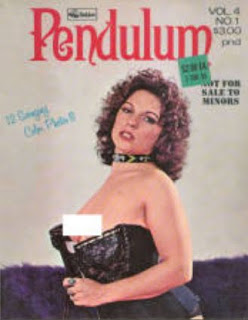 |
| It's a dirty job, but somebody's gotta do it. |
NOTE: This article continues my coverage of Angora Fever: The Collected Short Stories of Edward D. Wood, Jr. (BearManor Bare, 2019).
 |
| Pendulum, vol. 4, no. 1. |
The story: "The Exterminator," originally published in Pendulum, vol. 4, no.1, April/May 1972. Credited variously to "Ann Gora" (on the page) and "Dick Trent" (on the table of contents).
Synopsis: It is the year 2307 A.D., and our unnamed narrator tells us that the earth has been dealing with a major crisis. There are too many people but not enough food for everyone. Technology has improved, including instantaneous abortions that have made other forms of birth control obsolete. But people keep having sex and making babies, while useless old folks keep living longer. Something had to give! Our narrator had the solution: every citizen must die on his or her 47th birthday. He himself headed up a department of exterminators that hunted down all those who did not comply voluntarily. This brutal policy has been in place for ten years and ends in just two days... but there's a terrible catch for our narrator.
Wood trademarks: Referring to children as "brats" (cf. "Taking Off," "Tank Town Chippie"); "down through the ages" (cf. Glen or Glenda, One Million AC/DC); warfare (cf. "No Atheists in the Grave," Glen or Glenda); contempt for the elderly (cf. "Mice on a Cold Cellar Floor"); missionary position (cf. "Missionary Position Impossible"); contempt for procreation (cf. "Tank Town Chippie").
Excerpt: "I've also read in the history books about some world leader named Hitler in the twentieth century who exterminated millions during his reign… think of that… millions…that's a great number of anything. But that dealt with humans. He knocked off millions and it still did no good. Millions more grew up to take their place and the world was off and running again… all downhill where the bread line was concerned."
 |
| Dudley Manlove in Plan 9. |
Ed Wood is sometimes classified as a science-fiction writer because of Plan 9 from Outer Space (1959), but he didn't really work within that genre very often. "The Exterminator" is one of Ed's relatively rare excursions into sci-fi territory, and about the only thing it has in common with Plan 9 is a certain cold detachment about the issues of life and death. In that famous film, alien Eros (Dudley Manlove) solemnly declares, "Life is not so expansive on my planet. We don't cling to it like you [earthlings] do. Our entire aim is for the development of our planet." And that's what "The Exterminator" is about, too: valuing the health of the planet over individual lives.
Edward D. Wood, Jr. died at the age of 54, and we generally think of that as a tragedy. (He didn't even live to see his name become famous!) But maybe Eddie himself didn't see it that way. In "Mice on a Cold Cellar Floor," the young lovers promise each other that they'll never let themselves get old. And in this story, Eddie wages all-out war on senior citizens. "Earth found itself being cluttered up with a bunch of elderly people who could no longer produce any important activity," he writes. "They were simply taking up space which rightfully belonged to the young." It's very possible that Eddie saw the final years of Bela Lugosi and Kenne Duncan and decided that he didn't want anything like that to happen to him. He didn't cling to life, in other words.
Not that Eddie had any more affection for the very young. It is very clear from this story -- and others in the Wood canon -- that our man had some longstanding issues with fatherhood. In these stories, at least, babies are just grubby, screaming little creatures who exist to drain resources and make their parents miserable. And it's all women's fault, too, because they're the ones who want to have babies in the first place. Men everywhere are getting tied down by wives and children, all because they wanted to have sex.
 |
| Original artwork from the story. |
"The Exterminator" captures Ed Wood in what I think of as his "big picture" mode. Every once in a while, Eddie likes to ponder the entire human race -- what we do, why we do it, and our place in this vast universe. You'll know Eddie is in this mode when he starts talking about time as an abstract concept. This very story uses the phrase "the beginning of time" at least three times. Our narrator in this story is so emotionally disengaged, so focused only on the big picture, that he even sees war as merely population control.
This kind of lofty, abstract "big picture" thinking is fairly common in the Wood canon. You get some ponderous narration about men and women and sex, for instance, in both One Million AC/DC (1969) and The Young Marrieds (1972). Eddie even starts that last film with footage of waves crashing ceaselessly against the shore. Glen or Glenda (1953) is quintessential "big picture" Ed Wood stuff. Our two dueling narrators, Bela Lugosi and Timothy Farrell, both make broad, sweeping generalizations about the human race ("People... all going somewhere!"), and the movie sometimes just stops to stare at traffic or at people walking down a busy street, a la Koyaanisqatsi (1983).
But Glenda has an intimate, personal tale to tell, too, about its title character and his struggles with his sexuality and identity. And that's sort of what happens in "The Exterminator." Most of the story is about the human race in general, but within that framework, we have the fate of one single man, the exterminator himself. So this story is both "macro" and "micro" at the same time.
Next: "Time, Space and the Ship" (1972)
